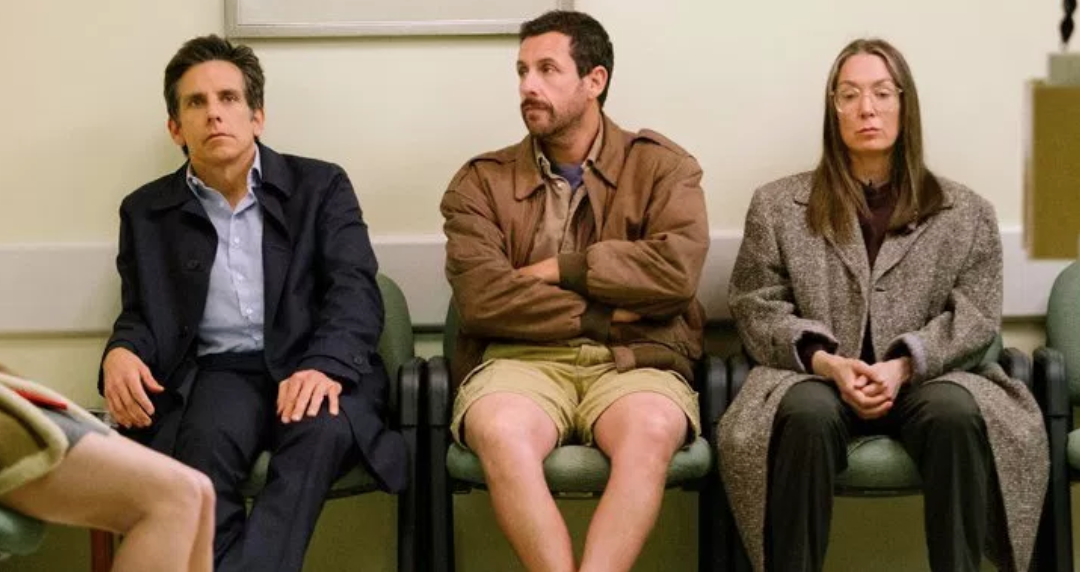Considering Noah Baumbach’s working relationship with Wes Anderson (the two co-wrote The Life Aquatic with Steve Zissou and Fantanstic Mr. Fox together), it’s unsurprising that a hint of his fellow auteur might creep in occasionally to his work–as is the case with his latest, The Meyerowitz Stories (New and Selected). Like Wes Anderson’s definitive masterpiece, The Royal Tenenbaums, the narrative is contingent upon the backdrop of New York and focuses on a gifted and broken family of artists, the patriarch of which has let down each of his children in different and innovative ways.
This instance of Royal, Harold Meyerowitz (Dustin Hoffman), however, isn’t a con man to others so much as to himself. A longtime sculptor and teacher of the subject at Bard, Harold has been consistent in one thing as a father: telling his children of his brilliance and the overrated, undeserved fame of others in his field, including his frenemy and contemporary, L.J. Shapiro (Judd Hirsch). While Harold has been relegated to a state of atrophy and self-imposed domestication in the Berkshires with yet another wife, Maureen (Emma Thompson), a woman he has to dangle “treats” to like putting in a pool to get her to stop drinking, L.J. is getting a retrospective at the MoMA. His lesser loved oldest son, Danny (Adam Sandler, redeeming himself after a string of bad acting choices), is present when Harold gets the call from L.J. inviting him to the opening. Indeed, Danny is forced to stay with Harold and Maureen after separating from his wife in the wake of their daughter Eliza’s (Grace Van Patten) admission to Bard to pursue filmmaking. For as Danny insists, the relationship just doesn’t work without Eliza as a distraction. After a humiliating appearance at the MoMa during which Harold and Danny show up in tuxedos amid everyone else dressed casually in comparison and Harold is then told he’s not on the list (though L.J. does eventually let him in), Harold lashes out at Danny by accusing him of needing to get a real job as he’s never worked in his life. And it’s true, first his propensities for the piano thrown by the wayside lead to him becoming a house husband, and now, in his later life, he’s left with little of his own, emotionally speaking.
Meanwhile Matthew (Ben Stiller), Harold’s youngest son from a separate marriage to a woman named Julia (Candice Bergen) is thriving in his stead as a manager of people’s wealth, including musicians like Randy (Adam Driver, barely in the film, but who, one imagines, Baumbach simply wanted to re-create the chemistry present between him and Stiller from While We’re Young). Somewhat mirroring the character of Chas in The Royal Tenenbaums, Matthew is the one most angry with Harold in spite of the fact that he favored him more overtly than all the others. As Harold insists, “I made a real effort with you. Danny and Jean, I could’ve done better. But I don’t see anything significant I could’ve done better with you.” Matthew counters, “Really? Nothing?” Harold shrugs, “Oh come on Matthew.” Matthew seethes, “You feel like that all was great? Danny definitely got shit, and Jean didn’t even get shit. But I got your focus and that fucked me up in a whole other way.”
So it goes that the dysfunction of the children Meyerowitz all stems from their narcissistic yet unsuccessful in his field father. Jean, the Margot of the trio, is just like her Anderson foil, ignored and under appreciated primarily as a result of being a woman in a family of chauvinists who can’t see the value in anything other than artistic output. Thusly, she rebels by finding contentment in her position as an office worker, showcasing the ultimate in defiance against all her father stands for. And yes, all three children want nothing more than to be the antithesis of Harold, with Matthew confirming, “That’s right, I don’t take after you. None of us do. You had to be the only artist in the family!”
Harold’s obsession with excellence in art and intellectualism has only made him more of a curmudgeonly ranter in his old age, at one point railing against Julia to Matthew, “Your mother is ultimately more comfortable being with men who are half-smart. Then she can dominate. I was much too formidable. After our separation and before Cody, she was with a homosexual, and before that a man with no foot. Her fraudulent claims about not reading fiction I find offensive. She’s masquerading as a populist so as not to offend Cody. It’s a shame your mother, who knows better, has succumbed to this fashionable anti-art movement.”
Matthew endures Harold’s tantrums and neuroses complacently at first, telling himself that he’ll only be in New York for a short time anyway, but then ultimately snaps when Harold finally pushes him over the edge. Thus, what is the only plot point that can bring the family together? The same one in The Royal Tenenbaums: the threat of the patriarch’s imminent brush with mortality.
As each child must come to terms with his or her flawed relationship with Harold, they are all forced to reconcile the idea they had of him in their youth cannot stand. As Maureen puts it after waffling about giving away her wok to Goodwill, “I haven’t made Chinese food in ten years. But you have your idea of yourself, and you want to hold on to that.” Sometimes, however, holding onto old images of ourselves or the people we love can keep us in a perilous state of stagnation and therefore depression.
That’s how the Tenenbaums ultimately got through their issues–by letting go and forgiving–and that, too, is how the Meyerowitzes get through theirs.






















